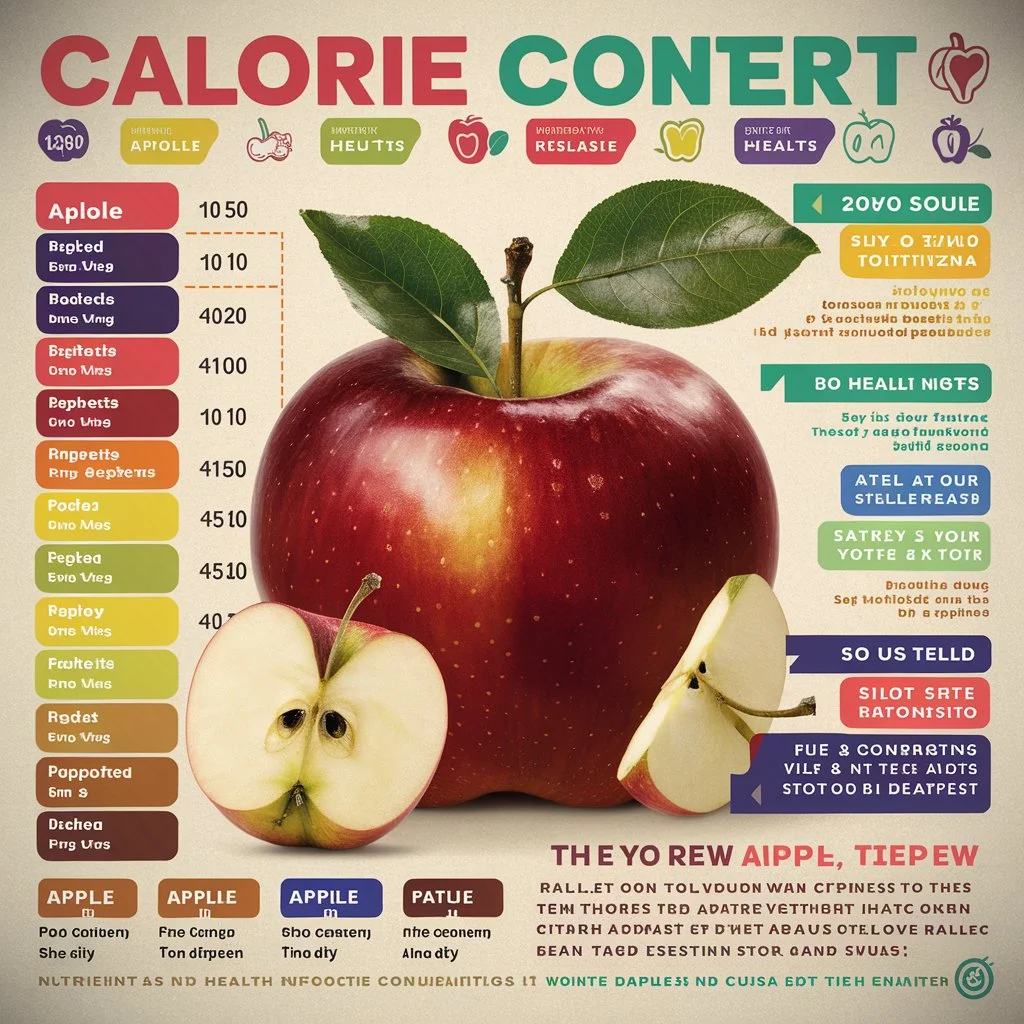Uncover how many calories are in an apple and how this fruit fits into a balanced diet. Get detailed insight.
Understanding the calorie content of an apple is crucial for anyone striving to maintain a healthy diet. Apples are not only delicious and versatile but also packed with essential nutrients that can benefit your health in many ways. In this article, we will explore the calories in an apple, including:
- The nutritional breakdown of different apple varieties
- Factors affecting calorie content
- Health benefits and how to incorporate apples into your diet
By the end of this article, you’ll have a comprehensive understanding of how apples can fit into your daily nutritional needs.
Nutritional Breakdown of an Apple
Overview of Apple Varieties
Apples come in various varieties, each with its own unique flavor, texture, and nutritional profile. Some popular varieties include Fuji, Granny Smith, Gala, Honeycrisp, and Red Delicious. Each type has slightly different nutritional values and flavors, making them suitable for different uses in cooking and snacking. Understanding these differences can help you select the right apple for your needs.
General Nutritional Content
Apples are rich in vitamins, minerals, and antioxidants, making them a healthy choice for any diet. Here’s a general breakdown of the nutritional content of a medium-sized apple (approximately 182 grams): Calories: About 95, Carbohydrates: 25 grams, Fiber: 4 grams, Vitamin C: 14% of the Daily Value (DV), and Potassium: 6% of the DV. These values provide a solid foundation for a healthy diet, contributing to your overall well-being.
Antioxidants and Phytochemicals

Apples are also packed with antioxidants and phytochemicals such as quercetin, catechin, and chlorogenic acid. These compounds help combat oxidative stress and inflammation, contributing to overall health. The antioxidant properties of apples can help reduce the risk of chronic diseases and improve your body’s defense mechanisms. Including apples in your diet can be a great way to boost your intake of these beneficial compounds.
Calories in Different Types of Apples
Fuji Apples
Fuji apples are known for their sweet flavor and crisp texture. A medium-sized Fuji apple typically contains 90-100 calories. Their sweetness makes them a popular choice for snacking and salads. This variety is not only tasty but also provides a satisfying crunch, making it a favorite among many apple enthusiasts.
Granny Smith Apples
Granny Smith apples are tart and slightly sour, making them a popular choice for baking. A medium-sized Granny Smith apple contains 80-90 calories. Their tart flavor makes them ideal for adding a zesty touch to recipes. They are also known for their firm texture, which holds up well in cooking and baking.
Gala Apples
Gala apples are sweet and juicy, with a thinner skin compared to other varieties. A medium-sized Gala apple contains 90-95 calories. Their mild sweetness and crisp texture make them a great option for eating fresh or adding to salads. They are widely available and favored for their consistent flavor and texture.
Honeycrisp Apples
Honeycrisp apples are renowned for their perfect balance of sweet and tart flavors. A medium-sized Honeycrisp apple contains 80-90 calories. Their name reflects their delightful taste and crunch. They are often enjoyed raw and are a popular choice for both snacking and cooking due to their balanced flavor profile.
Red Delicious Apples

Red Delicious apples are mildly sweet with a thick skin. A medium-sized Red Delicious apple contains 90-95 calories. They are known for their deep red color and slightly sweet taste. This variety is often used for fresh eating and can be a visually appealing addition to fruit salads and cheese platters.
Factors Affecting Calorie Content in Apples
Size and Weight
The size and weight of an apple significantly affect its calorie content. Larger apples naturally contain more calories compared to smaller ones. This is due to the greater amount of fruit flesh and sugars present in bigger apples. Therefore, it’s important to consider apple size when tracking calorie intake.
Ripeness Level
The ripeness level of an apple can also influence its calorie count. As apples ripen, their sugar content increases, which can slightly raise the calorie count. Riper apples are generally sweeter and may have a marginally higher calorie content compared to less ripe ones. The change in calorie count is usually minimal but can be noticeable in some cases.
Organic vs. Conventional Apples

There is often debate over whether organic apples have different calorie content compared to conventional apples. While the calorie difference is minimal, organic apples are often preferred for their lack of pesticides and higher nutrient content. Organic farming practices can also lead to apples with richer flavors and potentially more beneficial nutrients. However, the calorie content remains largely unchanged between organic and conventional varieties.
Health Benefits of Apples
Rich in Dietary Fiber
Apples are an excellent source of dietary fiber, which aids in digestion and promotes a feeling of fullness. This can help with weight management and prevent overeating. The fiber in apples, particularly soluble fiber like pectin, supports healthy bowel movements and can contribute to lower cholesterol levels. Including apples in your diet can help improve digestive health and keep you feeling satisfied.
High in Vitamins and Minerals
Apples are high in vitamin C and potassium, which support immune function and heart health, respectively. Regular consumption of apples can help boost your immune system and maintain healthy blood pressure levels. Vitamin C is essential for collagen production and skin health, while potassium helps regulate fluid balance and muscle function. These vitamins and minerals are crucial for overall health and wellness.
Antioxidant Properties
The antioxidants in apples help reduce inflammation and combat oxidative stress, which can lower the risk of chronic diseases such as heart disease, diabetes, and cancer. Antioxidants like quercetin and flavonoids neutralize harmful free radicals in the body. By reducing oxidative damage, apples contribute to long-term health benefits and may improve overall quality of life.
Benefits for Digestive Health

The fiber in apples supports digestive health by promoting regular bowel movements and preventing constipation. This can also contribute to a healthy gut microbiome. A well-functioning digestive system is essential for nutrient absorption and overall well-being. Incorporating apples into your diet can help maintain digestive health and support a balanced gut environment.
Comparing Apple Calories to Other Fruits
Apples vs. Bananas
Bananas are another popular fruit, but they have a higher calorie content compared to apples. A medium-sized banana contains about 105 calories. While bananas offer different nutritional benefits, such as higher potassium levels, they also have more calories per serving compared to apples. Choosing between apples and bananas can depend on your dietary goals and preferences.
Apples vs. Oranges
Oranges are similar to apples in terms of calorie content. A medium-sized orange contains approximately 62 calories. Oranges provide a different set of nutrients, such as higher vitamin C content, and can be a refreshing alternative to apples. Comparing the calorie content and nutrient profiles of these fruits can help you make informed dietary choices.
Apples vs. Berries
Berries, such as strawberries and blueberries, are lower in calories compared to apples. For example, one cup of strawberries contains about 50 calories. Berries are also rich in antioxidants and can be a great addition to a low-calorie diet. However, apples offer a different texture and taste, making them a versatile fruit choice for various recipes.
Nutritional Advantages of Apples

Despite the slightly higher calorie content, apples offer a unique combination of fiber, vitamins, and antioxidants that make them a valuable addition to any diet. The overall nutritional benefits of apples, including their contribution to heart health, digestion, and disease prevention, outweigh the minor calorie differences. Including apples in your daily diet can provide essential nutrients and support a balanced lifestyle.
Incorporating Apples into a Balanced Diet
Suggested Daily Intake of Fruits
The USDA recommends consuming at least 2 cups of fruit per day. Including apples in your daily diet can help you meet this requirement while providing essential nutrients. Apples can be a convenient and versatile fruit choice, easily incorporated into various meals and snacks. Consuming a variety of fruits, including apples, can contribute to a well-rounded and nutritious diet.
Breakfast Ideas
- Oatmeal with Apple Slices: Add fresh apple slices and a sprinkle of cinnamon to your morning oatmeal for a nutritious start to the day. This combination provides fiber, vitamins, and a satisfying flavor.
- Apple Smoothie: Blend apples with spinach, Greek yogurt, and a splash of almond milk for a refreshing and healthy smoothie. This smoothie is rich in nutrients and can be a quick breakfast option.
Lunch Options
- Apple and Chicken Salad: Combine diced apples, grilled chicken, mixed greens, and a light vinaigrette for a tasty and balanced salad. This salad offers a mix of protein, fiber, and vitamins.
- Apple Sandwich: Use apple slices instead of bread for a low-calorie, gluten-free sandwich filled with peanut butter or cheese. This alternative provides a unique flavor and texture while reducing calorie intake.
Snack Ideas
- Apple with Peanut Butter: A classic and satisfying snack that combines the sweetness of apples with the protein of peanut butter. This combination provides a balanced snack option with healthy fats and protein.
- Apple Chips: Slice apples thinly, sprinkle with cinnamon, and bake until crispy for a healthy alternative to potato chips. Homemade apple chips are a crunchy and nutritious snack choice.
Dessert Recipes
- Baked Apples with Cinnamon: Core apples, fill with a mixture of oats, nuts, and spices, and bake until tender for a delicious and healthy dessert. This recipe offers a warm and comforting treat with added nutritional benefits.
- Apple Crisp: A lighter version of traditional apple pie, made with oats, honey, and a hint of cinnamon. This dessert is lower in calories and provides a satisfying sweet option.
Tips for Choosing and Storing Apples
Selecting Fresh Apples
When choosing apples, look for firm, smooth, and unblemished skin. The apple should feel heavy for its size, indicating juiciness. Avoid apples with bruises or soft spots, as these can indicate spoilage. Selecting high-quality apples ensures better flavor and freshness.
Best Storage Practices
To maintain freshness and nutritional value, store apples in the refrigerator. Place them in a plastic bag with holes to allow for proper air circulation. Proper storage helps prevent spoilage and extends the shelf life of your apples. Keeping apples chilled can also preserve their crisp texture and flavor.
Common Myths and Misconceptions about Apples and Calories
Myth: All Apple Calories Are the Same
Fact: Calorie content can vary between different apple varieties and sizes. It’s important to consider these factors when calculating your calorie intake. Different varieties and sizes may have slightly different calorie counts, which can impact your overall nutritional balance.
Myth: Apples Can Replace Entire Meals
Fact: While apples are nutritious, they should not be used as a sole meal replacement. A balanced diet should include a variety of foods to ensure adequate nutrient intake. Apples can be part of a healthy meal but should not replace other essential food groups.
Myth: Apples Lose Calories When Cooked
Fact: Cooking apples does not significantly change their calorie content, but it can alter their nutritional profile, such as reducing vitamin C levels. The primary impact of cooking is on texture and flavor, rather than a significant change in calorie count.
FAQs
How many calories are in a medium apple?
A medium-sized apple typically contains about 95 calories. This can vary slightly depending on the apple variety and its size.
Do different types of apples have different calorie counts?
Yes, different types of apples can have slightly different calorie counts. For example, a Fuji apple might have around 90-100 calories, while a Granny Smith apple usually has 80-90 calories.
Does cooking apples change their calorie content?
Cooking apples does not significantly change their calorie content. However, cooking can affect the nutrient levels and texture of the apples.
Are organic apples lower in calories than conventional apples?
The calorie content in organic apples is similar to that of conventional apples. The main difference is usually in the use of pesticides and growing practices, not the calorie count.
Can I eat apples on a diet?
Yes, apples are a healthy choice for a diet. They are low in calories, high in fiber, and packed with nutrients. Just be sure to watch portion sizes and include them as part of a balanced diet.
What is the best way to store apples to keep them fresh?
To keep apples fresh, store them in the refrigerator. Place them in a plastic bag with holes to allow for proper air circulation. This helps maintain their crispness and flavor.
Conclusion
In conclusion, apples are a delicious and nutritious fruit that can fit perfectly into a healthy diet. Understanding the calories in an apple and their nutritional benefits can help you make informed choices. Remember to incorporate a variety of apple types and preparation methods into your meals to enjoy their full range of health benefits.
References
- USDA National Nutrient Database
- Harvard T.H. Chan School of Public Health
- Mayo Clinic
Share your favorite apple recipes or tips in the comments below! Don’t forget to subscribe to our blog for more health and nutrition articles.

I’m Matthew Porter, the creative mind behind “Acknowledgment Templates.” I’ve had a blast creating templates that capture the essence of gratitude in acknowledgment sections. At Acknowledgment Templates, we’re all about turning appreciation into a well-crafted art. Let’s make your acknowledgment section a masterpiece—join me in the creative process at Acknowledgment Templates!











